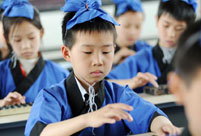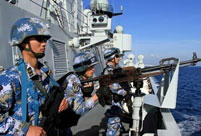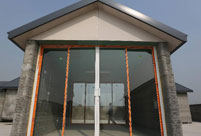 Ni Ni covers BAZAAR JEWELRY
Ni Ni covers BAZAAR JEWELRY
 Cherry blossoms reach peak bloom in Washington D.C.
Cherry blossoms reach peak bloom in Washington D.C.
 Top Chinese fashion icons in foreigners' eyes
Top Chinese fashion icons in foreigners' eyes
 Asia's largest business aviation exhibition to be held in Shanghai
Asia's largest business aviation exhibition to be held in Shanghai
 World's top-rated luxury hotels
World's top-rated luxury hotels
 Wu Jing, Xie Nan to hold wedding on May
Wu Jing, Xie Nan to hold wedding on May
 London Cake International attracts tourists
London Cake International attracts tourists
 Let's dance in harmonic Shaanxi
Let's dance in harmonic Shaanxi
 Christie's to auction dazzling diamonds
Christie's to auction dazzling diamonds
 'Model husband' shatters image of love
'Model husband' shatters image of love
As the Ukrainian crisis evolves, relations between Russia and Ukraine and between Russia and the West contunue to deteriorate. Last month, the US-led Group of Seven (G7) decided to suspend participation in the Group of Eight (G8) and abandon the scheduled G8 summit to be held in Sochi in Russia. At the same time, they discussed measures to impose sanctions against Russia in energy, banking and national defense. Barack Obama and the leaders of G7 have now decided to exclude Russia from the G8.
Referring to the boycott of the summit of the G8 in June in Russia, Vladimir Putin left no doubt as to his views: "If our partners do not want to come, so be it." Russia is not particularly concerned about the loss of membership of the "rich man's club".
The international and regional situations are currently undergoing complex and profound changes. Following the spread of the financial crisis and the rapid rise of new economies, the G8 can no longer make unilateral decisions. Its role and influence in the economic sphere are in question.
On the international stage, Russia makes its presence felt not only through the framework of the G8. It also plays an important role in multilateral mechanisms, including the UN, the G20, BRICS, SCO and APEC.
Excluding Russia from the G8 may be intended as a kind of warning shot from the U.S. and its allies, but Russia does not care about the weakening G8.
G8 becoming G7 is a return to the model of "a club of strong powers from the West" which existed before 1998, but in reality it has very limited influence in Russia. The country is still actively involved in many mechanisms for international consultation. In addressing major global issues such as the DPRK nuclear issue, the Iranian nuclear program, and the world's fight against terrorism, Russia is still a key player.
Unilateral attempts by Western countries to break Russia's links with the outside world are doomed to failure. But if Russia did actually finds itself excluded from the international, the West would suffer considerable fallout.
Russia occupies a key position in geopolitics. We cannot underestimate its impact as a major political power. In recent years, the Russian economy has followed an improving trend, and its position in the world economy has steadily strengthened. It has played an active role in numerous international negotiations. In the UN, Russia participates actively in consulting on and resolving global issues. Within the framework of the Customs Union, Russia supports initiatives to promote economic integration.
Xing Guangcheng, director of the Research Center for Frontier History and Geography of China at the Chinese Academy of Social Sciences, believes that Russia will not quit the mechanisms for international consultations. In the future it will continue, as far as possible, to lobby for international support on the world stage. Xing notes that what is behind the complicated situation in the Ukraine is a plethora of competing forces. The struggle of boycott and anti-boycott will continue.
Russia's active participation in international negotiation mechanisms will promote the healthy development of the international situation, maintain the international strategic balance, and help to develop strategic cooperation.
Sun Zhi, a Researcher from the Shanghai Cooperation Organization Research Center of the Chinese Academy of Social Sciences, takes the view that Russia will continue to maintain channels of communication with the west: "Russia hopes to take part in international affairs, but its relations with western society have deteriorated badly in recent years, and as a result its dialogue and cooperation with the international community has been affected."
As a major power, Russia is inextricably linked to the west. It will continue to be an active participant in international affairs in the future.
This article is edited and translated from 俄罗斯国际角色缺不了
Source: People's Daily; Author:Yang Ning and Tao Yiping
 Cherry blossoms hit peak bloom in Washington D.C.
Cherry blossoms hit peak bloom in Washington D.C. Children in ancient costumes learn Zhusuan
Children in ancient costumes learn Zhusuan Tens of thousands celebrate Water Splashing Festival
Tens of thousands celebrate Water Splashing Festival A bite of China II whets the appetite
A bite of China II whets the appetite Chinese frigate completes its 14th escort mission
Chinese frigate completes its 14th escort mission Let's dance in wealthy Shaanxi
Let's dance in wealthy Shaanxi A date with 798: feel the art around you
A date with 798: feel the art around you 3D-printed houses built in Shanghai
3D-printed houses built in Shanghai World largest scale of umbrella dance
World largest scale of umbrella dance The backstage of the Fashion Week
The backstage of the Fashion Week College students in Han costumes
College students in Han costumes Postgraduate works as waitress
Postgraduate works as waitress Life in a Lahu village in Yunnan
Life in a Lahu village in Yunnan An orphan’s wedding
An orphan’s wedding Hollywood documentary brings Diaoyu Islands truth to new audience
Hollywood documentary brings Diaoyu Islands truth to new audienceDay|Week|Month